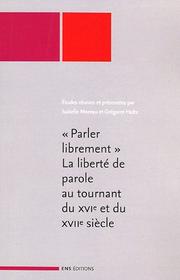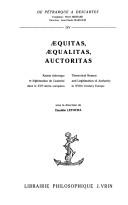| Listing 1 - 7 of 7 |
Sort by
|
Book
Year: 1923 Publisher: Paris : Edouard Champion,
Abstract | Keywords | Export | Availability | Bookmark
 Loading...
Loading...Choose an application
- Reference Manager
- EndNote
- RefWorks (Direct export to RefWorks)
Book
ISBN: 8886609086 9788886609081 Year: 1997 Volume: 7 Publisher: Roma: Memini,
Abstract | Keywords | Export | Availability | Bookmark
 Loading...
Loading...Choose an application
- Reference Manager
- EndNote
- RefWorks (Direct export to RefWorks)
Book
ISBN: 2600004963 Year: 2001 Publisher: Genève : Droz,
Abstract | Keywords | Export | Availability | Bookmark
 Loading...
Loading...Choose an application
- Reference Manager
- EndNote
- RefWorks (Direct export to RefWorks)
LA BOETIE (ETIENNE DE), ECRIVAIN FRANCAIS, 1530-1563 --- PHILOSOPHIE POLITIQUE --- DISCOURS DE LA SERVITUDE VOLONTAIRE --- FRANCE --- 16E SIECLE --- SOURCES

ISBN: 2847880682 2847884440 Year: 2005 Publisher: ENS Éditions
Abstract | Keywords | Export | Availability | Bookmark
 Loading...
Loading...Choose an application
- Reference Manager
- EndNote
- RefWorks (Direct export to RefWorks)
Des guerres de religion à la Fronde, la France connaît une période d’instabilité politique et religieuse propice à toutes les licences. C’est dans ce cadre mouvant, en perpétuelle redéfinition, que prennent place un certain nombre d’imprimés remarqués pour leur virulence ou leur portée transgressive. La liberté de parole relève d’un geste libératoire, comme l’attestent les réactions des institutions ou des ordres interpellés. Cet excès, tant idéologique que verbal, doit être mesuré à l’aune de la réglementation progressive des savoirs, des normes morales et des pratiques censoriales qui les défendent. Des espaces éditoriaux à ceux, bien réels, des institutions, se joue aussi l’affirmation de la persona auctoriale, mise en scène et mise en cause par l’imprimé subversif – fable, dialogue philosophique ou invective pamphlétaire. Qu’est-ce que la liberté de parole ? Les communications réunies dans le présent ouvrage ont en commun d’articuler les enjeux idéologiques de la liberté à une approche pragmatique des actes de langage. Au terme d’un tel parcours, il est possible de dire ce qui informe les limites du dicible et du publiable à un moment donné : comment et pourquoi certains auteurs, plutôt que d’autres, furent condamnés pour avoir voulu «parler librement». From the Wars of Religion to the Fronde, France experienced a period of political and religious instability conducive to all manner of impropriety. It was against this evolving backdrop, which was constantly redefining itself, that a number of printed texts noted for their virulence or their transgressive impact appeared. Freedom of speech stems from a liberating act, as the reactions of institutions and associations concerned attest. This excess, as ideological as it is verbal, should be measured against the progressive control of knowledge, moral standards and the censorial practices which defend them. From editorials to the concrete world of institutions, we also see the assertion of the authorial…
LITTERATURE FRANCAISE --- LIBERTE D'EXPRESSION --- LIBERTINAGE --- LIBERTINAGE DANS LA LITTERATURE --- LA BOETIE (ETIENNE DE), ECRIVAIN FRANCAIS, 1530-1563 --- LA MOTHE LE VAYER (FRANCOIS DE), ECRIVAIN ET PHILOSOPHE FRANCAIS, 1588-1672 --- PHILOSOPHIE ET SCIENCES --- 16E SIECLE --- HISTOIRE ET CRITIQUE --- 17E SIECLE --- THEMES, MOTIFS --- FRANCE --- DISCOURS DE LA SERVITUDE VOLONTAIRE --- CRITIQUE ET INTERPRETATION --- liberté de parole --- idéologie

ISBN: 2847880682 2847884440 Year: 2005 Publisher: Lyon ENS Editions
Abstract | Keywords | Export | Availability | Bookmark
 Loading...
Loading...Choose an application
- Reference Manager
- EndNote
- RefWorks (Direct export to RefWorks)
Des guerres de religion à la Fronde, la France connaît une période d’instabilité politique et religieuse propice à toutes les licences. C’est dans ce cadre mouvant, en perpétuelle redéfinition, que prennent place un certain nombre d’imprimés remarqués pour leur virulence ou leur portée transgressive. La liberté de parole relève d’un geste libératoire, comme l’attestent les réactions des institutions ou des ordres interpellés. Cet excès, tant idéologique que verbal, doit être mesuré à l’aune de la réglementation progressive des savoirs, des normes morales et des pratiques censoriales qui les défendent. Des espaces éditoriaux à ceux, bien réels, des institutions, se joue aussi l’affirmation de la persona auctoriale, mise en scène et mise en cause par l’imprimé subversif – fable, dialogue philosophique ou invective pamphlétaire. Qu’est-ce que la liberté de parole ? Les communications réunies dans le présent ouvrage ont en commun d’articuler les enjeux idéologiques de la liberté à une approche pragmatique des actes de langage. Au terme d’un tel parcours, il est possible de dire ce qui informe les limites du dicible et du publiable à un moment donné : comment et pourquoi certains auteurs, plutôt que d’autres, furent condamnés pour avoir voulu «parler librement». From the Wars of Religion to the Fronde, France experienced a period of political and religious instability conducive to all manner of impropriety. It was against this evolving backdrop, which was constantly redefining itself, that a number of printed texts noted for their virulence or their transgressive impact appeared. Freedom of speech stems from a liberating act, as the reactions of institutions and associations concerned attest. This excess, as ideological as it is verbal, should be measured against the progressive control of knowledge, moral standards and the censorial practices which defend them. From editorials to the concrete world of institutions, we also see the assertion of the authorial…
LITTERATURE FRANCAISE --- LIBERTE D'EXPRESSION --- LIBERTINAGE --- LIBERTINAGE DANS LA LITTERATURE --- LA BOETIE (ETIENNE DE), ECRIVAIN FRANCAIS, 1530-1563 --- LA MOTHE LE VAYER (FRANCOIS DE), ECRIVAIN ET PHILOSOPHE FRANCAIS, 1588-1672 --- PHILOSOPHIE ET SCIENCES --- 16E SIECLE --- 17E SIECLE --- FRANCE --- DISCOURS DE LA SERVITUDE VOLONTAIRE --- CRITIQUE ET INTERPRETATION --- HISTOIRE ET CRITIQUE --- THEMES, MOTIFS --- liberté de parole --- idéologie
Book
ISBN: 2070739384 9782070739387 Year: 1995 Volume: *10 Publisher: Paris: Gallimard,
Abstract | Keywords | Export | Availability | Bookmark
 Loading...
Loading...Choose an application
- Reference Manager
- EndNote
- RefWorks (Direct export to RefWorks)
Authors, French --- Biography --- Montaigne, Michel de, --- La Boétie, Estienne de, --- Friends and associates --- La Boétie, Estienne de, --- Montagne, Michel de, --- Montenʹ, Mishelʹ, --- Montanʹe, Mikhaĭlo, --- Montaigne, Michel Eyquem de, --- Montaigne, --- Montēnyu, --- Montaini, Misel d̲e, --- דה־מונטן, מישל, --- די־מונטין, מיכאל, --- מונטין, מישל דה, --- Montenj, Mišel de, --- La Boési, Ėt'en de, --- Boétie, Estienne de La, --- De La Boétie, Estienne, --- La Boétie, Etienne de, --- La Boʼesi, Eṭiyen de la, --- לא באעסי, עטיען דע --- לא בואיסי, אטיין די --- Friends and associates. --- La Boétie, Etienne de --- de Montaigne, Michel Eyquem --- Eyquem, Michel --- Monten', Mišel' --- Authors, French - 16th century - Biography --- Montaigne, Michel de, - 1533-1592 - Friends and associates --- La Boétie, Estienne de, - 1530-1563 --- La boetie (etienne de), ecrivain francais, 1530-1563 --- Montaigne, Michel de, - 1533-1592

ISBN: 2711611035 9782711611034 Year: 1992 Publisher: Paris: Vrin,
Abstract | Keywords | Export | Availability | Bookmark
 Loading...
Loading...Choose an application
- Reference Manager
- EndNote
- RefWorks (Direct export to RefWorks)
Autorité --- Philosophie politique --- Philosophie européenne --- Humanisme --- Égalité --- Philosophy, Renaissance - Congresses. --- Authority - History - 16th century - Congresses. --- Authority --- Philosophy, Renaissance --- Political science --- Authoritarianism --- Consensus (Social sciences) --- History --- Congresses --- Congresses. --- BODIN (JEAN), ECONOMISTE ET PHILOSOPHE FRANCAIS, 1529-1596 --- CRITIQUE ET INTERPRETATION --- PIC DE LA MIRANDOLE (GIOVANNI PICO DELLA MIRANDOLA), PHILOSOPHE ITALIEN, 1463-1494 --- MORE (THOMAS), HOMME POLITIQUE ET HUMANISTE ANGLAIS, 1478-1535 --- PENSEE POLITIQUE ET SOCIALE --- ERASME, DIDIER (1469-1536) --- MACHIAVEL (NICOLAS), HOMME POLITIQUE ET PHILOSOPHE ITALIEN, 1469-1527 --- LUTHER (MARTIN), REFORMATEUR RELIGIEUX ALLEMAND, 1483-1546 --- MÜNZER (THOMAS), REFORMATEUR ALLEMAND, 1489-1525 --- THEOLOGIE --- LIPSE, JUSTE (1547-1606) --- POLOGNE --- VIE INTELLECTUELLE --- 16E SIECLE --- EGLISE CATHOLIQUE --- HISTOIRE --- CONCILE DE TRENTE, 1545-1563 --- INFLUENCE --- CALVIN (JEAN CAUVIN, DIT), REFORMATEUR RELIGIEUX ET ECRIVAIN FRANCAIS, 1509-1564 --- OEUVRES THEOLOGIQUES --- MONTAIGNE (MICHEL EYQUEM DE), ECRIVAIN FRANCAIS, 1533-1592 --- PHILOSOPHIE --- LA BOETIE (ETIENNE DE), ECRIVAIN FRANCAIS, 1530-1563 --- JESUITES --- FRANCE --- 16E-20E SIECLES --- HISTOIRE DES IDEES --- HISTOIRE DES DOCTRINES --- HISTOIRE RELIGIEUSE --- 16E-17E SIECLES --- Histoire religieuse --- Vie intellectuelle
| Listing 1 - 7 of 7 |
Sort by
|

 Search
Search Feedback
Feedback About UniCat
About UniCat  Help
Help News
News